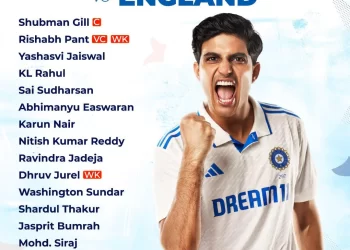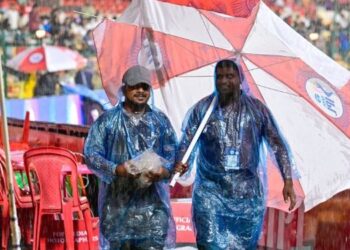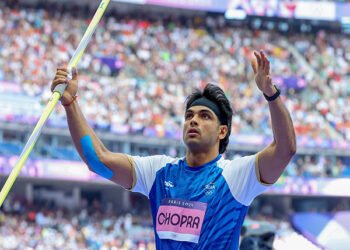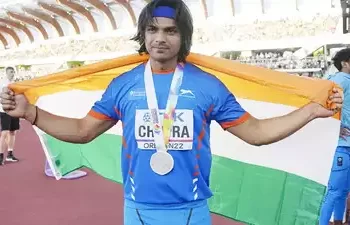On the eve of their record-equalling sixth Netball World Cup, Clarke and Geva Mentor – England’s two most-capped players – are reminiscing about how it all began; a dual journey they started together for England Under-17s more than two decades ago and poised to end imminently.
It was in 2001 that Mentor, then just 16, was called up to the senior England squad for the first time to take on New Zealand on foreign soil. The Silver Ferns would seal a 3-0 series whitewash on the court, but debutant Mentor was to claim a longer-lasting prize off it.
“It was quite funny,” she recalls. “In New Zealand, [appliance manufacturer] Fisher & Paykel were the main sponsors.
“After the last game they organised a competition where both teams had to shoot a ball into an open washing machine – one you filled from the top. Everyone, players and staff from England and the Silver Ferns, stood on the line and had a go.
“Old goal keeper over here, who can’t hit a post to save her life, managed to get the first round in and then again in the second round. Eventually, I was up against the physio from the Silver Ferns. I got one in and she missed again so I won – and the prize was a fridge!
“They were asking me whether I wanted it to open on the left side or right side. I was only 16 so had no idea and was on the phone to my mum asking her.”
More than 22 years later, the stainless steel appliance still sits on the upstairs landing of Mentor’s mother’s house in Bournemouth.
As England prepare their bid for World Cup glory, few players can claim to have impacted the national side more than Clarke, 39, and Mentor, 38.
Both played key roles in the Roses’ ground-breaking 2018 Commonwealth Games triumph that propelled the sport onto the front pages and into the public consciousness.
So sparse was netball coverage when the pair started out that Clarke was unable to even watch a single England match until the 2002 Commonwealth Games, just a few months before her own international debut.
“When we were growing up it just wasn’t in the media,” she adds. “It’s been such a huge shift.
“Back then, our domestic league was just watched by our family and friends. I had no way of watching England. I had an older sister so I’d watch her play and I’d watch the county seniors – players like Tracey Neville and Karen Greig played at Greater Manchester, so I’d aspire to be like them.
“But even though I couldn’t see it, I always dreamt of playing for England. I wouldn’t have thought back then that the sport would get to where it has done.”
Things have changed beyond recognition. In South Africa over the next fortnight, the England squad will have access to the type of video analysis, data science and advanced training theories befitting their status as one of the best teams in world netball.
Yet far from the professional set-up enjoyed by today’s full-time and centrally-contracted players, Mentor and Clarke were raised on a more rudimentary operation.
“We used to meet every other weekend, but would hardly have any time together to get everything done,” says centre Clarke, whose 200 England caps are a world record for a single country.
“Now it’s a full-time programme, so we meet Monday to Thursday every week.
“The coaches used to do pretty much everything, but now we have a nutritionist, psychologist and so much more support all around.”
Given the close-knit nature of the sport, the pair have become accustomed to navigating changing relationships over the course of their careers.
While team-mates have come and gone, others have become superiors.
At those 2002 Commonwealth Games in Manchester, a teenage Mentor shared a room with Jess Thirlby, who is now in her fourth year as England head coach.
“We’ve also got Sonia [Mkoloma], who is one of my best mates, as our assistant coach, and Olivia Murphy, who was our technical coach, was my first England captain,” says Mentor, who has played 167 times for her country.
“The beauty of it is we see everyone as people first and then those roles second. You’ve got the foundations in place in terms of those friendships and from that you can build the respect around the roles that they play in netball. We are all fortunate enough that we get on really well.
“We’ve all been in teams before where we’ve been young and you have a coach that is a lot older – like being a kid at school with a mother figure. Now we’re older than some of the staff.”
That has potential to cause problems for players like Thirlby, who was a peer for most of Mentor and Clarke’s careers, and now leads the team despite lacking her former team-mates’ depth of playing experience.
Nonetheless, Thirlby remains in awe of two players who have continued to defy age and withstand the intensifying rigours of a sport that has become increasingly professional.
“My overarching feeling is how bloody lucky are we to have two of the oldest, smartest, most knowledgeable players still playing at this level?” she says. “It’s incredible.
“I was around Geva when she first came to a session at Team Bath and she was a gangly 15-year-old who tripped most of us up in training. It is incredible for those like me to have been a senior player when she broke onto the scene and now we’re in a whole other lifetime, but she’s still playing.
“They are both fantastic role models and we’re so fortunate they have stayed in the game this long. They look good though, right? They are like fine wines, getting better with age.”







 Finance
Finance







